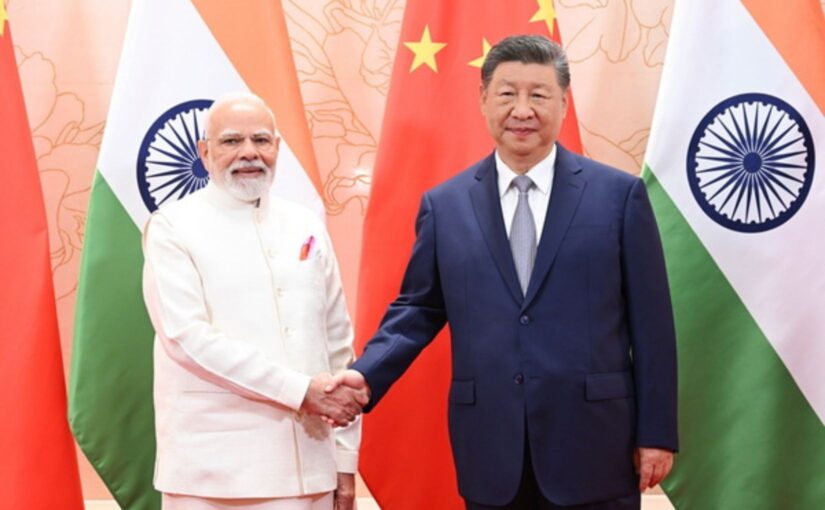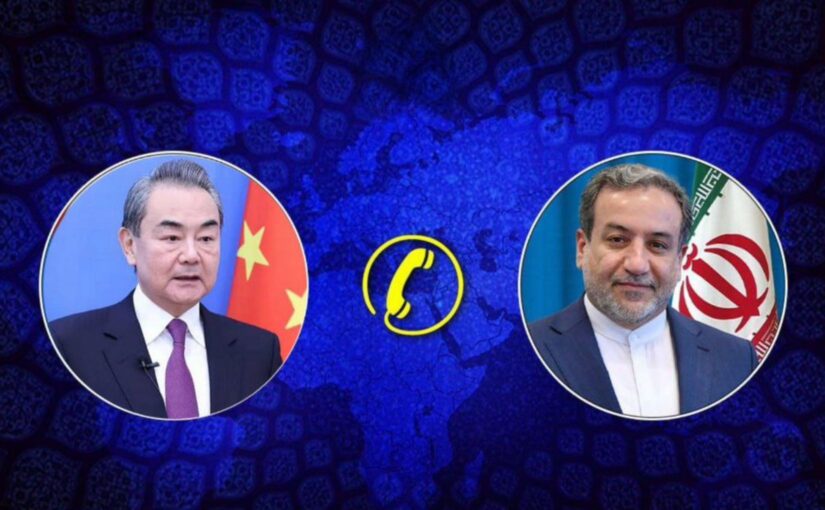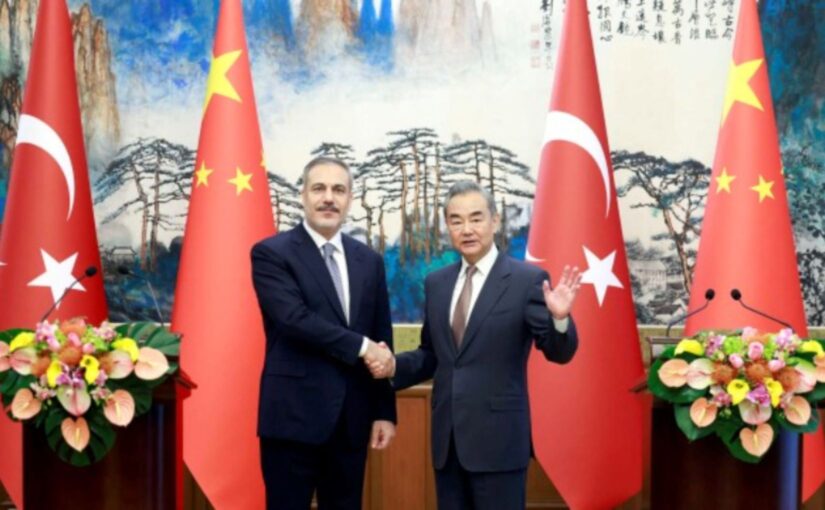Turkish Foreign Minister Hakan Fidan, who is considered a rising star in his country’s political scene, visited China from June 3-5.
The visit was treated as having a broader significance, while also representing an important advance in bilateral relations. The wider context was highlighted by Global Times, which wrote:
“China has been in close communication with Muslim countries in the Middle East recently amid the worsening situation in Gaza, as Turkish Foreign Minister Hakan Fidan started his visit to China on Monday, just a few days after the 10th ministerial conference of the China-Arab States Cooperation Forum. Chinese analysts said that apart from boosting bilateral cooperation, China will strengthen cooperation and coordination with Türkiye and other major powers in the region to jointly promote a sustainable ceasefire in the continuing Palestinian-Israeli conflict.”
It added: “With regard to bilateral relations, the visit will boost the China-Türkiye cooperation under the framework of the Belt and Road Initiative, as Türkiye is a key partner of China with an important location bridging Asia and Europe, and also a major power in the region.”
The newspaper further noted that “the ongoing crisis in Gaza further strengthens unity among Muslim countries.
“On Sunday, a day ahead of Fidan’s visit to China, Iranian Caretaker Foreign Minister Ali Bagheri Kani and Türkiye’s top diplomat called on Muslim states to employ everything in their capacity to support Palestinians and stop the crimes by Israel in the Gaza Strip, according to a statement released by the Iranian Foreign Ministry.
“On the topic of the Palestinian-Israeli conflict and the tragedy in Gaza, China and Muslim countries, including Arab states, Türkiye and Iran, share a similar stance calling for peace and an immediate and sustainable ceasefire to save Palestinian lives, and they all support the just cause of the Palestinian people to restore their legitimate national rights and also to become a full member of the UN… [meanwhile] the Biden administration is now facing increasing internal and external pressures, and even NATO allies like Türkiye are dissatisfied with the role that the US is playing, which allows the bloodshed to continue in the Gaza Strip.”
This broader context likely accounts for the fact that Fidan’s first reported meeting in Beijing, on June 3, was with Politburo member Chen Wenqing, the head of the Commission for Political and Legal Affairs of the Communist Party of China (CPC) Central Committee.
Their talks focused on security matters. The Xinhua News Agency reported Chen as stating that, guided by the important consensus of the leaders of the two countries, China is willing to work with Türkiye to continuously bring cooperation in the field of security to new heights, enrich and expand the connotations of bilateral ties, protect the security interests of both countries in an improved manner, and contribute actively to the peace and development of both countries, the region and the world.
In his meeting with his Turkish counterpart on June 4, Foreign Minister Wang Yi said that building a comprehensive, deep and high-level China-Türkiye relationship is in the fundamental interests of both countries and peoples.
He noted that China and Türkiye are both ancient civilisations and important members of the G20, and are facing profound challenges in the changing international situation, so they should strengthen communication and coordination to make positive contributions to promoting regional peace and global development.
China is willing to maintain multi-level exchanges with Türkiye, play a good role in mechanisms such as the China-Türkiye Intergovernmental Cooperation Committee, promote effective connections between the joint construction of the Belt and Road Initiative and Türkiye’s Middle Corridor Initiative, expand cooperation areas, and explore their potential.
China is also willing to expand imports of high-quality agricultural products from Türkiye, support the continuous improvement of cooperation levels and technological content of enterprises in both countries, and strengthen cooperation in culture, education, tourism, aviation, and other fields.
Wang added that both sides should strengthen coordination and cooperation within the framework of the United Nations (UN) and other multilateral frameworks, support the UN in playing a core role in the global governance system, oppose hegemonism and power politics, oppose a few countries monopolising international affairs, oppose building walls and barriers, “decoupling” and “cutting off supply chains,” maintain the stable operation of the global supply chain and industrial chain, and promote the establishment of a fair and reasonable global governance system.
Fidan said that Türkiye and China have important influence in their regions and globally. China’s development is crucial to world peace and prosperity. Türkiye opposes bloc confrontation, does not agree with or support erroneous actions that suppress China’s development, and does not allow any force to engage in activities on Turkish territory that harm China’s sovereignty and security.
The Middle Corridor Initiative is highly compatible with the Belt and Road Initiative, and Türkiye is willing to cooperate closely with China to achieve more substantive results in trade, investment, finance, agriculture, tourism, education, and other fields through mechanisms such as the China-Türkiye Intergovernmental Cooperation Committee. Türkiye highly appreciates China’s fair and just position on issues concerning Ukraine and the Middle East and looks forward to working constructively with China to make greater contributions to the prosperity and stability of the region and the world.
Both sides also agreed that it is necessary to promote a ceasefire in Gaza and maintain peace and stability in the Middle East. The Palestinian issue is at the core of Middle Eastern issues. The Gaza conflict is currently the focus, and the priority is to achieve an immediate, comprehensive, and permanent ceasefire, improve humanitarian conditions, and release all detained individuals.
Both China and Türkiye support Palestine becoming a full member of the UN and support internal reconciliation in Palestine. China and Türkiye will strengthen cooperation to jointly promote the early and comprehensive, fair, and lasting resolution of the Palestinian issue.
On the Ukraine issue, Wang said that China’s position is firm and consistent, and the aim is to promote peace and dialogue. Although the conditions for negotiations are not yet in place, China is committed to peace and will not stop its efforts. As long as there is a glimmer of hope, every effort must be made to strive for it.
Wang said China believes that the world needs to hear more objective, balanced, positive, and constructive voices on the Ukraine crisis. China and Brazil jointly issued a six-point consensus recently on promoting a political solution to the Ukraine crisis, emphasising adherence to the three principles of cooling the situation: no spillover from the battlefield, no escalation of the conflict, and no provocation by any party. Within just one week, 45 countries from five continents have responded positively to the six-point consensus in different ways, with 26 countries already confirming their participation or seriously studying how to join. China believes that the more people participate in the joint appeal, the greater the hope for cooling the situation and the smaller the risk of escalation of the conflict.
Fidan also met the same day with Chinese Vice President Han Zheng.
Earlier, on June 3, Fidan visited the Centre for China and Globalisation (CCG) think tank and delivered a speech.
He discussed the Trans-Caspian East-West Middle Corridor Initiative, noting that this trade route will start from Türkiye and reach China via the Caucasus, Caspian Sea and Central Asia, parallel to China’s Belt and Road Initiative. He also emphasised its benefits in uninterrupted and rapid access to the Black Sea and Mediterranean basins as well as other regions of Europe and Africa.
He further cited Türkiye’s customs union agreement with the European Union (EU) and its pursuit of new opportunities for cooperation with different partners in such platforms as the BRICS cooperation mechanism. According to the South China Morning Post, he said that BRICS could offer “a good alternative” to the EU. Nearly four decades ago, Türkiye applied to join what was then the European Economic Community (EEC), and in 1999 it was officially recognised as a candidate for full membership in the EU. However, Fidan said that due to “identity politics”, meaning the fact that Türkiye is a Muslim majority nation of over 86 million people, its membership has been consistently blocked by some major EU powers. “So, you have to look for other alternatives. Certainly, we would like to become a member of BRICS. So, we’ll see how it goes this year.”
Fidan added that he looked forward to attending the BRICS Foreign Ministers meeting, to be held in the Russian city of Nizhny Novgorod the next week, preparatory to October’s summit in Kazan.
On May 31, Russian Foreign Minister Sergey Lavrov had said that the doors of BRICS were “open to representatives of the most diverse economic and political systems and macro-regions. The only condition is that you must agree to work on the basis of the key principle of the sovereign equality of states.”
In his speech, Fidan also highlighted the rich historical and cultural interactions shaping ties between Türkiye and China, referring to them as two great civilisations. He emphasised that these interactions form the strong and lasting foundation of their partnership, citing significant cultural and commercial exchanges facilitated by the historical Silk Road. He noted that the Ottomans sent many envoys to China carrying Ottoman rifles, which could be considered a form of “technology transfer” during that period.
Referring to the designation of the two countries’ relationship as a “strategic partnership” in 2010, Fidan pointed out the intentions of both sides to expand this cooperation. He underscored President Recep Tayyip Erdoğan’s visit to China in 2019 and emphasised this partnership, as displayed during a meeting with his Chinese counterpart Xi Jinping in the Uzbek city of Samarkand in September 2022. Fidan further said that China is Türkiye’s largest trading partner in Asia and third largest in the world, with the bilateral trade volume surpassing $48 billion in 2023, a record high. He also acknowledged the trade imbalance between the two nations in favour of China and underlined the importance of exploring new areas to balance bilateral trade and ensure the sustainability of commercial relations. Fidan also highlighted the crucial role of China’s direct investments in economic ties, emphasising that Türkiye provides an investment-friendly environment for foreign companies.
“Türkiye’s geostrategic position, along with our extensive commercial ties, provides free and easy access to a market of approximately 1.5 billion people and a value of $28 trillion, extending from Europe to the Middle East, North Africa and Central Asia. All of these are within a flight distance of four hours.”
He also stressed that while Palestinians have long been suffering, this reached an unprecedented level after October 7 last year. “Gaza was once referred to as the world’s largest open-air prison. Now, it has become the world’s largest open-air graveyard. There is currently no place in Gaza that could be considered safe. The humanitarian tragedy unfolding before our eyes has worsened with Israel’s attack on (the city of) Rafah.” He added that Türkiye has been striving to secure a ceasefire in Gaza, prevent the conflict from spilling over into other regions and ensure the uninterrupted delivery of humanitarian aid since Israel’s attacks began in October last year. He further said that Ankara, like Beijing, has highlighted the necessity of an independent, sovereign and geographically contiguous State of Palestine with its capital in East Jerusalem based on the 1967 borders within the framework of a two-state solution.
Another extremely significant aspect of the Turkish Foreign Minister’s trip was that he concluded it in the Xinjiang Uygur Autonomous Region, visiting both the capital Urumqi as well as the city of Kashgar.
Welcoming his visit, regional party secretary Ma Xingrui said that under the strategic guidance of leaders of the two countries, friendly exchanges and practical cooperation in various fields between China and Türkiye have made positive progress. And thanks to the development of China-Türkiye bilateral relations, exchanges between China’s Xinjiang region and areas in Türkiye have become increasingly close.
Fidan noted that during his visit to China’s Xinjiang region, he observed well-developed urban facilities, social prosperity, and good protection of various ethnic cultures and languages.
Türkiye’s stance on Xinjiang-related issues, he said, is clear and firm. It resolutely opposes terrorism, does not support or participate in anti-China activities using ethnic issues, and does not allow activities in Türkiye that harm China’s security or undermine China’s territorial integrity.
The Xinjiang region is a window for China to cooperate with Central Asia and countries such as Türkiye. Both sides should work together to strengthen anti-terrorism cooperation, expand exchanges and interactions, and promote new progress in cooperation in areas such as trade, agriculture, and civil aviation.
The South China Morning Post reported that in Kashgar, which is widely seen as the “cradle of Uygur culture”, Fidan visited the Mausoleum of Yusuf Khass Hajib, a famous 11th century Turkic poet, and the Id Kah Mosque, the largest in Xinjiang. He tweeted of his visit to Urumqi and Kashgar: “Finally, I visited these two ancient cities thanks to my contacts in China.”
Regarding the economic significance of his visit to Xinjiang, the paper reported Li Lifan, a research fellow from the Shanghai Academy of Social Sciences, as saying that Türkiye’s implementation of EU standards, due to their customs union, would be attractive to Chinese companies, while cultural and linguistic similarities could also appeal to Uygur entrepreneurs.
He also mentioned that Türkiye is a Shanghai Cooperation Organisation dialogue partner and seeks to become a full member of the organisation.
Earlier, at a joint press conference with Foreign Minister Wang Yi, Fidan had said that Urumqi and Kashgar play “a bridging role” between China and the Turkish as well as the Islamic world. “They are symbols of our historical friendship and neighbourhood.”
The South China Morning Post article further noted that two months ago, Xinjiang had also hosted a visit by Bassam Zakarneh, a member of the Revolutionary Council of Palestine’s Fatah party, leading a delegation that also included leaders of left-wing political parties from Syria, Egypt, Lebanon, Iraq, Yemen, Jordan and Tunisia.
The following articles were originally published by Global Times, the Xinhua News Agency and Daily Sabah.



